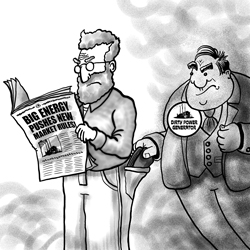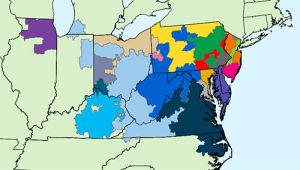
A cartoon that appeared in The CUB Voice.
For more than a year now, CUB has been sounding the alarm about a potential ruling at the Federal Energy Regulatory Commission (FERC) that could raise ComEd power bills by up to $864 million a year. There have been delays in that ruling, but we now believe it is imminent.
There is an urgent need for the Illinois General Assembly to step in and protect consumers from this rate hike, by passing the Clean Energy Jobs Act (CEJA). Here’s what you need to know, and how you can fight to protect your power bills.
What’s happening at FERC?
At the end of August, FERC Commissioner Cheryl LaFleur retired, breaking a 2-2 deadlock on the commission that regulates the nation’s energy markets. That opens the door for FERC to pass a proposal favored by out-of-state power generators that would be devastating to our electric bills. It also would hamper Illinois’ efforts at becoming a national leader in securing clean, affordable electricity for consumers. The plan would overhaul the rules for an auction that determines the prices in a special electricity market called the “capacity market.” That would inflate market prices to prop up struggling fossil fuel power plants and, in effect, make ComEd customers pay higher power bills for dirty power that they don’t need.
How much would this cost consumers?
A new analysis estimates that northern Illinois consumers could see future rate hikes increasing bills by up to $864 million a year.
When is a ruling expected?
The ruling was first expected in early September, but it has been delayed, and is now expected some time before the end of the year. That’s why this issue is urgent. The Illinois General Assembly has a chance to fix this, but legislators have to act immediately.
What can I do?
Support legislation in Springfield called the Clean Energy Jobs Act (CEJA). CEJA includes capacity market reforms that would shield electric customers from skyrocketing bills. Also, educate yourself about this important issue. You may not know it, but EVERYONE pays for “capacity” on their electric bills.

The PJM power grid stretches from Illinois to the East Coast.
What is capacity?
Not only do you pay for the power you use now, but you also pay for power you could use in the future. Capacity refers to extra payments consumers give power plant operators for the commitment to have enough electricity available if demand suddenly spikes. (Think of a hot summer afternoon, when everyone blasts the air conditioning.)
The price for capacity for ComEd customers is determined through auctions run by PJM Interconnection, the power grid operator for northern Illinois and all or part of 12 other states and Washington, D.C.. (Ameren’s market is run by a different power grid operator.)
In these auctions, big power generators bid against each other for the right to cover a certain amount of future power, if needed, and win those capacity payments. The plan that FERC is considering–the one favored by out-of-state fossil-fuel generators–would change the rules that govern these auctions and make us pay more.
Important: The next auction to determine capacity prices in Northern Illinois is early in 2020. That’s why the General Assembly has to act immediately to save customers from the rate hikes.
How does capacity affect my bill?
For most customers, capacity charges are embedded in the electricity supply charge on your power bill. While actual electricity prices have been relatively low in recent years, capacity has become a bigger and bigger part of your bill, and is now roughly 21 percent of the supply charge, according to the Illinois Commerce Commission. (By the way, alternative energy suppliers as well as ComEd buy electricity on this market. So you won’t escape capacity charges by changing suppliers.)
CUB has long said that capacity market auction rules are stacked against consumers, causing us to pay higher bills for more capacity than we actually need. And this new plan pushed by PJM and fossil fuel generators could make it even worse.
Why do generators want to change the rules?
Big out-of-state corporations that own fossil fuel power plants—companies like Vistra and NRG—and their allies want to change the capacity auction rules to offset state legislation, like Illinois’ historic Future Energy Jobs Act. The act, passed in 2016, expands energy efficiency and gives financial support to clean energy generators, helping to depress prices in the capacity market. That’s good for our power bills, but it cuts into the profits of fossil-fuel power plants.
How do the fossil-fuel generators want to change the market?
Basically, those generators want to artificially inflate the capacity price. That means we would pay more on our electricity bills to prop up power generators—including coal-fired power plants— that normally wouldn’t be able to compete in the capacity market. So we would be paying more for power we don’t need. CUB Executive David Kolata told Crain’s Chicago Business that the proposed changes would have “devastating consequences for Illinois consumers” and punish the state for making clean energy improvements like the Future Energy Jobs Act.
So how would the Clean Energy Jobs Act fix this?
To answer the threat by these giant power generators, the Clean Energy Jobs Act (follow-up legislation to FEJA) would have the Illinois Power Agency (IPA) manage Illinois’ own capacity market. The IPA already manages the power purchases of the state’s biggest electric utilities, and it could take over management of Illinois’ own capacity market.
While the current capacity market rules are stacked against consumers, the IPA could make the entire process much more consumer-friendly and fair—and it would put Illinois in charge of its own clean energy policy. The agency should be positioned to ensure that Illinois consumers save money while the state greatly expands clean energy investment.
Please send a message to your state legislators asking them to support the Clean Energy Jobs Act. Don’t let fossil fuel generators control your electric bills.

